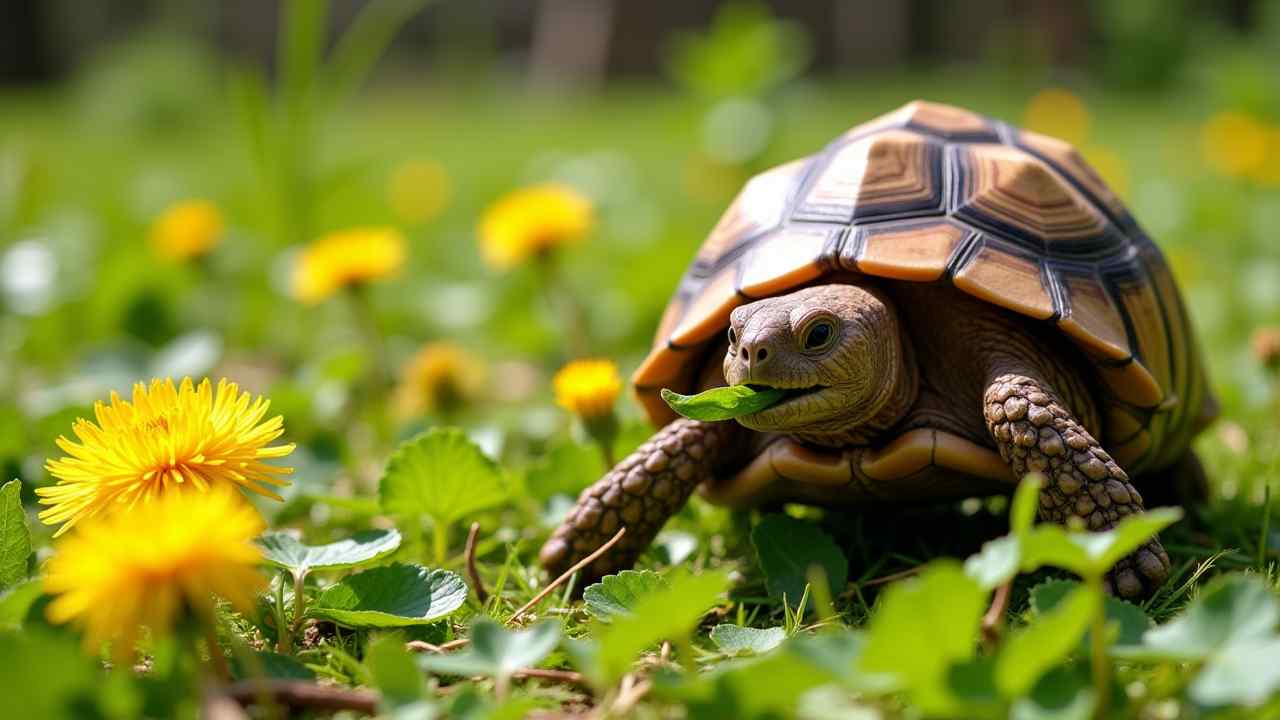
🐢 The Ultimate Russian Tortoise Diet Guide (Weeds, Greens & More!)
🐢 The Ultimate Russian Tortoise Diet Guide (Weeds, Greens & More!) 🐢
The Russian tortoise is a small and hardy reptile. Their engaging personality makes them a popular pet. These tortoises can live for over 50 years. Their long, healthy life depends entirely on proper care.
Nutrition is the most important part of that care. In the wild, they graze on fibrous plants. Our goal is to replicate this natural diet. A proper Russian tortoise diet is high in fiber and calcium. It should be very low in protein and fat.
This guide will cover everything you need to know. We will explore the best and worst foods. Let's create the perfect diet plan. This will ensure your shelled friend thrives for decades to come. ✅
🌿 What is the Foundation of a Healthy Russian Tortoise Diet?
The ideal diet for a Russian tortoise is simple. It should be based on broadleaf weeds and greens. This mimics what they would eat in the wild. Think of your pet as a natural grazer.
What Are the Best Weeds to Feed?
Weeds are the perfect food for your tortoise. They are nutritious and high in fiber. The best options include:
- Dandelion greens and flowers
- Clover
- Plantain weed (the common lawn weed)
- Sow thistle
Growing a tortoise-safe garden is a great idea. It provides a free and healthy food source. This is the cornerstone of a great Russian tortoise diet.
What Store-Bought Greens Are Good?
When fresh weeds are not available, you can use store-bought greens. Variety is very important. Good choices include Spring Mix, escarole, endive, and radicchio. These should be rotated to provide balanced nutrition.
How Often Should They Be Fed?
You should feed your tortoise every day. Provide a pile of fresh greens each morning. A good rule of thumb is a pile roughly the size of your tortoise's shell. They will graze on it throughout the day.
🤔 What Foods Should Be Given Only in Moderation?
Some foods are okay occasionally. However, they should not be daily staples. These items can cause health problems if fed too often. A balanced Russian tortoise diet is about knowing what to limit.
What About Dark Greens like Kale or Spinach?
Greens like spinach, kale, and chard are high in oxalates. Oxalates can prevent the body from absorbing calcium. They should only be a very small part of the diet. Never feed them as a primary food source.
Can Russian Tortoises Eat Vegetables?
Vegetables like bell peppers or squash should be avoided. They are not a natural part of their diet. A tiny piece once a month is not harmful. But they should be considered a very rare treat.
Can They Eat Commercial Tortoise Food?
Yes, high-fiber tortoise pellets can be helpful. Brands like Mazuri are a good choice. Offer a small amount, lightly moistened, once or twice a week. This can help fill any nutritional gaps.
🚫 What Foods Must You Absolutely Avoid?
This is the most important section for your pet's safety. Some foods are very dangerous for your tortoise. A healthy Russian tortoise diet means never feeding these items. Please avoid these foods completely.
Should You Feed Them Fruit?
Never feed your tortoise fruit. This is a common and dangerous mistake. Fruit is far too high in sugar. It can cause severe digestive problems. It can also lead to deadly parasite blooms in the gut.
Can They Eat Protein like Meat or Dog Food?
Absolutely not. Animal protein is toxic to their kidneys. It can cause painful kidney failure. It also leads to rapid, unhealthy shell growth. This condition is known as pyramiding.
What About Grains and Dairy?
Tortoises cannot digest these foods. Never feed your pet bread, pasta, or cereal. Dairy products like cheese and yogurt are also off-limits. These human foods can make your tortoise very sick.
☀️ What About Supplements and Water?
Proper supplementation is not optional. It is essential for your tortoise's long-term health. Without it, they can develop serious bone and shell problems. Water is also a critical component.
Do They Need Calcium?
Yes, calcium is vital. You should lightly dust their food with a plain calcium powder. Do this 3-5 times per week. Use a supplement that does not contain phosphorus or vitamin D3 for daily use.
What About Vitamin D3?
Tortoises create their own D3 from sunlight. A special UVB light bulb in their enclosure is essential. It allows them to metabolize calcium properly. Use a calcium powder with D3 added only sparingly, about once every two weeks.
Do They Need a Water Dish?
Yes, always provide fresh water. The dish should be very shallow. Your tortoise must be able to climb in and out easily. They will drink and soak in the dish to stay hydrated.